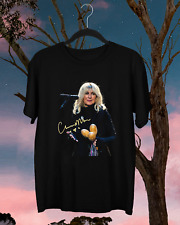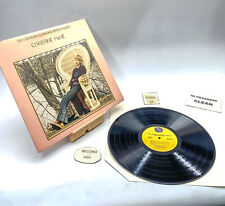Now in its 11th incarnation, Big Mac, as it has been called ("More than 40 million sold"), brings its traveling roadshow/soap opera to the Spectrum tonight to help push its latest album, Behind the Mask.
With the recently announced departure of Stevie Nicks and Christine McVie (John's ex) at tour's end to pursue their own interests, the group is moving toward another transfiguration, its shape as yet unknown.
Just how the band has survived - and why - is a mystery even to those who sustain it.
"This thing called Fleetwood Mac, for better or worse, is greater than all of us," says John McVie, 44, backstage before a concert at the Charlotte Coliseum. Gray-haired, bearded, with a penguin tattooed on his forearm, he is quiet, vague, a little lost. His drink is a big cup of cranberry juice and brandy.
"And it's like a thing, a nebulous entity that flies around. You're committed. And you should be committed. And, in the future, we will be committed," he continues, amused at his own wordplay.
For all that it reveals - a clandestine affair between Mick and the band's blond princess, Stevie Nicks; the huge quantities of cocaine sniffed - Fleetwood's book is remarkable in its restraint. Says McVie, "Mick's book comes out and there's a lot of apprehension: 'Will he say this? Will he say that?' There's so much stuff that he didn't say."
Says Fleetwood, a properly brought-up Englishman, whose late father was a wing commander in the Royal Air Force, "I just knew I wasn't going to be vindictive and cheap about it, and I feel that I haven't been."
The drummer is a thin stalk of a man, with piercing blue eyes, his iron- gray hair pulled back in a ponytail. Backstage, before the concert, he is dressed all in black, except for his turquoise suede shoes. Around his neck hangs a silver ball - a totem for this man.
He allowed no one to see the book before it was published last month - much to Nicks' dismay. This summer she lambasted him in US magazine: "I told him, 'Mick, if you slander me, babe, I'll bury you. I will write down everything that you have ever done and put it out.' "
Now, Fleetwood insists, Stevie wishes he had written more about her.
Fleetwood felt it was important to disclose their romance. "I don't fall in love every other day," he says now, "and she still is a soul mate of mine." What he writes is hardly salacious. As he tells it, their on-and-off affair began in New Zealand in 1977 during, believe it or not, his second marriage to his first wife.
We were driven back to our hotel in a ferocious downpour, clinging to each other in the back of the car. Up in her suite, I said, "I think I'd like to stay here tonight."
Later, Fleetwood flew to Hawaii to see her. Tripping on LSD, Nicks went to the wrong airport to meet him.
When the book, which took 2 1/2 years to write (with Stephen Davis, author of the Led Zeppelin book Hammer of the Gods), finally came out, everyone on the Fleetwood Mac jet pored over his or her copy. For the most part, it was well-received. Says John Courage, the band's longtime road manager, and, as the book recounts, its former cocaine procurer, "It all happened, it is what it is."
The group's lead guitarist, Rick Vito, who grew up in Glenolden, first saw the band play in 1968 at Philadelphia's Electric Factory. He and guitarist Billy Burnette joined Fleetwood Mac in 1987, a particularly tumultuous time. On the eve of the Tango in the Night tour, songwriter-guitarist Lindsey Buckingham (Nicks' ex-lover) had abruptly departed.
As Vito read Fleetwood's book he was struck with a realization: "All these passages of turmoil, or this drama or that drama . . . this is exactly the same as it is now."
He adds, "It's always been the kind of group that walks that fine line, that walks the edge. Danger!"
And the nuttiest member? "Mick," Vito replies without hesitation.
John McVie, for one, is not amused by the book. Mick Fleetwood is his oldest and best friend. They are charter members of the group, which was named for them both when it began in 1967 as a London blues outfit. A year later McVie married Christine Perfect, a singer for the British group Chicken Shack. They divorced in 1975, during a particularly dark period when he was awash in alcohol.
Seated in a small dressing room lit by blinding fluorescents, McVie says bitterly, "I think the ladies came off with halos, like they never made smells in the bathroom. I came off like a piece of -" He stops to check
himself, then bursts, "Oh, an awful person. Do you see me as that, Mick? I guess he did. An awful, awful person."
Christine, 47, a striking blonde whose dusky alto is a signature of the band, is portrayed as nearly superhuman. As Fleetwood tells it, men are always proposing to this fabulous female. He writes:
Christine could write music, play piano, sing like an angel, rehearse all day with the men, and cook a big dinner without batting an eye.
Nicks, a Californian who joined the band with her lover Buckingham in 1975, is described as delicate, moody. A Star. ("I'm about as fragile as a bull," she once told the Los Angeles Times.) Now 42, the Betty Ford Center grad (in 1987) still wears her blond hair to the middle of her back.
But the "sensuous gypsy girl," as Fleetwood calls her in the book, has lost some of her glow. Two hours of makeup go into creating the illusion; the flowing capes she wears on stage can't camouflage her new corpulence. (And those platform boots, where does she find them?)
"Stevie," says Fleetwood backstage. "Out of everyone in the band, she definitely has a double image. She appears to be, and is, a very different person than when she is off stage. Always has been. She is a performer, a true theatrical performer."
The Fleetwood Mac sound is baroque, swirling. The songs tell tales of love, of love gone wrong, of love gone. Fleetwood describes the music as: "mystic, timelessly triste."
Often, the band members' soaring harmonies on stage existed in striking counterpoint to the disharmony that existed off stage: Never was this more true than in 1976, during the making of their highly autobiographical album Rumours, which turned out to be one of the biggest hits of all time, selling 20 million copies.
This emotionally charged period represented the height of soap opera, even for Fleetwood Mac. The McVies, recently divorced, were barely speaking. Nicks had just walked out on Buckingham. And Fleetwood was in the midst of a stormy divorce from his wife, Jenny, mother of his two daughters. (Jenny is now a therapist. Fleetwood married Sara Recor, a former model, in 1988.)
Fleetwood writes: We went four or five weeks without sleep, doing a lot of drugs . . . cocaine in such quantities that at one point I thought I was really going insane. The whole atmosphere was really tense, with arguments all the time and people storming in and out. . . . We'd look for sexual release, but even that didn't help much.
The success of Rumours - which earned Fleetwood alone $3 million - led to excess: They became superstars of the highest order. Coke intake increased. (Each performer received a pre-concert allotment in a Heineken bottlecap.)
Band members flew on private planes with six limousines awaiting them at the airport. They required that hotels paint Chris and Stevie's rooms in pastel colors.
By 1984, seven years after the release of Rumours, Fleetwood was broke. The band hadn't played together in two years. His houses had been sold. He was sleeping at friends'. Eight million dollars, gone. Word was he'd put it all up his nose. If that were true, he writes, "I'd have been dead long ago."
"Basically," Fleetwood says, "I don't worry about money. I'm not a penny pincher. So when I went bankrupt it really didn't affect me that much. I wouldn't recommend it to anyone, but it didn't affect my personality."
He continues, "I've seen people who have gone broke and they're completely lost. Completely and utterly lost. And that is sad. People half expected me to be looking for the nearest bridge to jump off, or a chair of suitable height to kick away. But that never happened, and I'm glad."
But then Fleetwood has always been a survivor. Early on, the band lost three guitarists. Jeremy Spencer joined the Children of God. Danny Kirwan now lives on the streets, says Fleetwood. And the legendary Peter Green is a disheveled "Howard Hughes type." "John and I sometimes wonder - not really laughing - what have we been doing to these people to cause this to happen?" Fleetwood says.
He goes on. "I feel thankful that I have never ever bottomed out. That's not to say I wasn't lucky that I didn't bottom out, where I actually became ill or found myself ODing in a corner somewhere, thank God. That never, ever, ever happened.
"But I'm well aware of the fact that it just might well have happened. That is a sobering thought."
"Isn't it amazing how we got here," asks John McVie, "considering the people that fell by the wayside? Here we sit. All I've ingested. And those people are there, we're here. It's a bloody miracle."
With Nicks and Christine McVie leaving the group after Dec. 7 (although both say they will record the next album), the band is turning another page in its history. Fleetwood believes it will continue nevertheless. It has to.
"It's very plain and simple: We are musicians and we don't know how to do anything else," says McVie. "We're not going to send away for a computer- programming course from the back of a matchbook. It's too late. So we'll just keep doing it."









